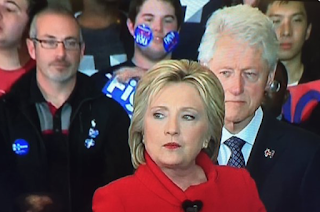The public argument between Apple and the FBI over cracking the encryption on an iPhone used by the San Bernardino Muslim terrorists is one of those ongoing civil liberties debates that negotiate the terms on which we are asked to sacrifice our civil liberties for the sake of Muslim immigration. We have already made a thousand accommodations and we will make a thousand more. There will be more databases, naked scanners, eavesdropping, vans that can see through walls, backdoors to every server, registrations, warrantless searches, interceptions and regulations. There will be heavily armed police on the streets. And then curfews and soldiers. These things exist in Europe. They'll come here. Some libertarians will argue that we should have none of this and no restrictions on immigration. That we should just shrug off each terror attack and move on with our lives. Eventually though there will be a terror attack that we can't shrug off and that can't be minimized by using t...
Search Blog
Hit enter to search or ESC to close
Showing posts from February, 2016
Posts
- Get link
- X
- Other Apps
Hillary Clinton is Her Own Worst Enemy
Hillary Clinton is her own worst enemy. Just as Bill Clinton's worst impulses did more to sabotage his presidency than any Republican, his wife's worst impulses have always undermined her. Some couples balance out each other's weaknesses, but Bill and Hillary enable each other's misbehaviors. While Hillary enabled her husband's abuse of women, Bill enabled her paranoia and obsessiveness. Now her flailing campaign is retreating into paranoia and conspiracy theories. The Intelligence Community Inspector General, an Obama appointee, is accused of conspiring with Republicans. The rise of Bernie Sanders is being attributed to “dark money” and political enemies by Clintonworld. Hillary Clinton has a longstanding tendency to turn to a dark conspiratorial mindset when things don’t go her way. She blamed her husband’s affair with Monica Lewinsky on a “vast right-wing conspiracy”. Her close friend’s papers reveal that Hillary thought Bill had been “driven” to the affair b...
- Get link
- X
- Other Apps
The First Year of President Bernie Sanders
On January 20, 2017, President Bernie Sanders was sworn into office. The elderly Vermont politician, who had always made waves, refused to use a bible, instead taking his oath on a smudged copy of his own economic five-year plan. He also unilaterally modified the presidential oath from “preserve, protect and defend” to “enhance, enrich and humanize the Constitution of the United States”. The unlikely candidacy of Bernie Sanders had shocked and divided a party and then a nation. President Sanders won the Democratic Party nomination by going far to the left and then, defying conventional wisdom, he moved even further to the left in the general election. Unable to retain the minority portion of the Obama coalition, many of whose leaders had been allied with Hillary Clinton and were still bitter over her loss and did little to help him, his victory relied heavily on youth voter turnout. Voter turnout in America had been falling since the sixties. But in 2016, it fell below the 50% ma...
- Get link
- X
- Other Apps
Good Islam and Bad Islam
Our only hope of defeating Islamic terrorism is Islam. That’s our whole counterterrorism strategy. But Islamic terrorism is not a separate component of Islam that can be cut off from it. Not only is it not un-Islamic, but it expresses Islamic religious imperatives. Muslim religious leaders have occasionally issued fatwas against terrorism, but terrorism for Muslim clerics, like sex for Bill Clinton, is a matter of definition. The tactics of terrorism, including suicide bombing and the murder of civilians, have been approved by fatwas from many of the same Islamic religious leaders that our establishment deems moderate. And the objective of terrorism, the subjugation of non-Muslims, has been the most fundamental Islamic imperative for the expansionistic religion since the days of Mohammed. Our strategy, in Europe and America, under Bush and under Obama, has been to artificially subdivide a Good Islam from a Bad Islam and to declare that Bad Islam is not really Islam. Bad Islam, as O...
- Get link
- X
- Other Apps
To Understand Trump, You Have to Understand New York
The conservative consensus around Trump has solidified into, "He's the devil" or "He's our savior." Either Trump is going to destroy the establishment and save us all. Or he's secretly in league with Hillary Clinton to rig the election. There's very little room for the middle ground here. But Trump isn't either of these things. He's just Trump. And it's important to understand who he is. Instead of the narratives that the different sides are building around him. Trump seems exotic in a Republican system dominated by D.C. insiders from northeastern suburbs and filled with southern and western candidates. But local politics in New York is filled with guys who have the same blend of liberal-conservative politics and talk and sound just like him. Giuliani's political career really began with him yelling , "He blames it on me! He blames it on you! Bulls__t" at a police rally. The cops then took over City Hall chanting, ...
- Get link
- X
- Other Apps
How Iran Took Obama Hostage
Obama and his political allies seek normalization with Iran. They are unconcerned with Iran’s nuclear weapons programs or its support for terrorism and they are willing to provide fig leaves for these and other threats by the Shiite terror state to the United States and to the rest of the free world. Iran, however, is looking to escalate its conflict with the United States. Perversely, normalization is the best strategy for escalating a conflict with the United States while extracting maximum benefit from it. Without normalization, Iran has few options for escalating its conflict with America. Islamic Revolutionary Guard Corps (IRGC) generals are fanatics, but they know that they cannot win a major military conflict with the United States. Instead, the IRGC terror hub seeks to carry out attacks that hurt the United States, but in ways that fall short of summoning up a full American military reprisal. Under Obama, Iran has more options than ever because the United States is n...
- Get link
- X
- Other Apps
The Traditionalist Rebel
Leftist movements begin with rebellion and end with conformity. No Utopian movement can tolerate rebels for long because there is no room for dissent in paradise. An ideal society, the goal of leftist political movements, not only has no room for war, racism, greed and all the other evils the conformist paradises of the left hope to eliminate, it also has no room for disagreement. The perfect society and its perfect ideology are also the perfect tyranny. Against this Utopian collectivism, which promises paradise and delivers a prison, is the traditionalist rebel who finds virtue in the acknowledgement of human flaws rather than in the unthinking pursuit of an unchanging perfection. The traditionalist rebel is not seeking perfection, but humanity. He is a skeptical idealist who is interested in character rather than movements. He is above all else an individualist with an instinctive distrust of any movement that requires him to abandon his rights for the greater good. The traditi...
- Get link
- X
- Other Apps
Will Banning Muslim Migration Ruin the Anti-ISIS Coalition?
The most common attack on proposals to end Muslim migration to the United States is that this policy would somehow interfere with the coalition to fight ISIS. Lindsey Graham asked, “How do you go to any of these countries and build a coalition when your policy is simply because you’re a Muslim you can’t come to America?” “This policy is a policy that makes it impossible to build the coalition necessary to take out ISIS," Jeb Bush objected. The White House agreed, “We have an over-60-country coalition fighting with a substantial number of Muslim-majority fighters who are absolutely essential to succeeding in that effort.” But there are two things wrong with this argument. First, no Muslim country or faction is fighting ISIS because they like us. They’re not doing us any favors. They’re protecting themselves from the Islamic State. The insistence of ISIS that it is the supreme authority over all Muslims has even led it into battles with Al Qaeda and the Taliban. No one fig...
- Get link
- X
- Other Apps





